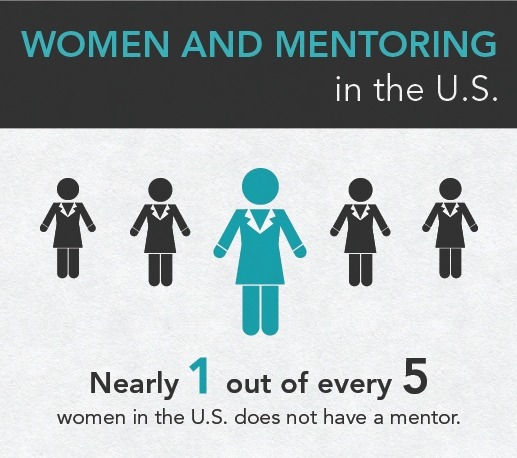By Nicole Williams (Connection Director, LinkedIn)
LinkedIn’s latest study found (in a survey of nearly 1,000 female professionals in the U.S.) that 82% of women agree that having a mentor is important.
But what will knock your socks off is that considering the competitive employment landscape, and the universal belief that mentorship is a critical component to career success, 19% (that’s nearly 1 out of every 5 women) have NEVER had a mentor.
Here is an infographic from LinkedIn:
Whether you are one of those people who have yet to take advantage of this career-advancing relationship or if you want to add another to your repertoire (yes, you can have more than one) here’s what you need to know.
A Reason, a Season or a Lifetime
Start with the goal in mind. While typically referring to friendships, I find this is one of the most effective ways of wrapping your head around what you’re looking for in a mentor.
Before you can address the where and how of it all, it comes down to having a very clear view of what you’re looking for.
Whether it be the insight of an expert to help answer a specific question that’s haunting you, or finding someone you want to emulate for their poise and integrity; the better you’re able to define what you’re looking for, the more apt you are to find it.
Always, Be On The Lookout
If there’s one piece of advice when it comes to finding a mentor it’s to think outside the box. We can easily get stuck thinking of mentorship as this formal, official way of relating to people in business; however, by narrowing our definition of who can help guide us in our careers, we can miss out on the potential mentors who are right under our noses (our neighbors, direct colleagues or even our relatives).
More importantly, it ignores those we may have never met in our life but would be happy to answer a quick question if you make a common connection online.
Try doing an Advanced People Search on LinkedIn and look for a mentor by narrowing your search parameters.
For example, because you can use LinkedIn to search for professionals by their title and the university that they attended, you could search for the following professionals: “current vice presidents of marketing that attended New York University” and try to connect with people by mentioning your shared alma mater.
You can even narrow the results down to your zip code so you can meet up with someone right in your own city.
Will You be My Mentor?
You’re not going to get anywhere if you’re not willing to ask, “Will you be my mentor?”
In general, people, especially successful people, want to help others by sharing the knowledge they’ve gained. While you don’t have to pose the question quite so formally, you do need to ask it.
Unless someone is actively seeking a mentee, you have to be proactive and set the grounds for a deeper relationship. In fact, 67% of the women LinkedIn surveyed said they had never mentored another professional because, “no one had ever asked.”
And here’s the deal: When asking, don’t make it sound like a death sentence.
Mentorship is responsible work but if there isn’t a promise of fun, initiative or excitement on your part (which can literally be conveyed by having a smile on your face), don’t expect your would-be mentor to embrace the opportunity to help you.
Quid Pro Quo
While the purpose of having a mentor is to further your learning and career, don’t forget that mentorship is a two-way street. You’re going to get more out of your relationship with your mentor if you:
- Don’t expect them to do the heavy lifting for you
- You make it easy on them (think closer to her office than yours when meeting face-to-face, and…
- They are receiving something in return for their help
Don’t Underestimate The Effects of Reciprocity
While you want your gift back to be as work-related as possible, you can make the gift as thoughtful as possible. For e.g. save your mentee time that she can spend on you. Whether it’s taking care of her kids or organizing her closet, you need to show your mentor that you’re grateful for their guidance — and, frankly, actions speak louder than words.
These are just a few tips I’ve gathered along my professional career that’s helped me build strong mentoring relationships. Have a mentor story you’d like to share, fire away; either in the comments below or @linkedin us on Twitter.
This post was originally posted at LinkedIn’s blog.



